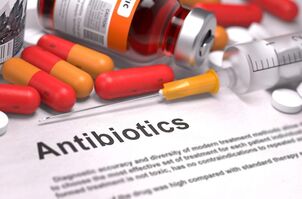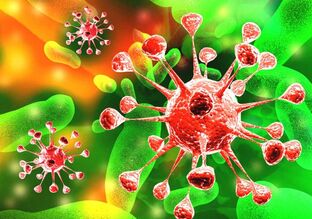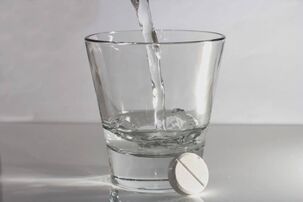Antibiotic therapy is the basis for the treatment of prostate inflammation. Antibiotics for prostatitis are divided into several categories. The choice of drugs depends on the nature of the inflammatory process and the characteristics of the patient's disease process. Generally, pathogenic microorganisms develop resistance to the active substance of the drug. In this case, the sensitivity of the pathogen to certain active substances should be considered when choosing antibiotic treatment, and the prescription should be prescribed only after the prostatic fluid has been analyzed for bacteria.
Why do we need antibiotics?

As prostatitis worsens, the first task is to stop the inflammatory process. For this reason, since only antimicrobial drugs can quickly eliminate pathogens that cause the inflammatory process, antibacterial treatment is indicated.
Symptomatic treatment without antibacterial drugs is ineffective and only produces temporary results. Any anti-inflammatory, analgesic and antipyretic drugs used for prostatitis can only be used for antibiotic treatment.
Eliminating disease factors can:
- relieve pain syndrome;
- Normalize body temperature;
- Improve urodynamics;
- can normalize prostate function.
Therefore, antibiotics for male prostatitis can not only eliminate the inflammatory process, but also reduce symptoms. The improvement in well-being is attributed to the elimination of swelling of inflamed organs. Inflamed organs always increase in size and put pressure on surrounding tissues, causing pain.
Antibiotics can treat the symptoms and causes of diseases.
The main advantages of antibacterial agents are fast acting and easy to use. Antibiotic treatment of prostatitis can be done with pills, injections or suppositories.
In order for the medicine to work really quickly, you need to choose strictly in accordance with the doctor's instructions. In order to determine the type of pathogenic microorganisms, it is necessary to carry out a series of examinations, first of all-a bacterial study of the composition of prostate secretions. Only by determining the cause of the inflammatory process, can we ensure the selection of the best drug that can quickly relieve the exacerbation of the disease.
It is important to note that antibiotics used for prostatitis can only be used to treat infectious forms of the disease, both acute and chronic. For non-infectious inflammation, its development is due to age-related changes or violation of prostate nutrition, so antibacterial drugs and adenomas should not be used.
Types of drugs
In the treatment of prostate inflammation, broad-spectrum drugs that are active against a large number of pathogens are preferred. This choice can be explained by the fact that in some cases, prostatitis is caused by several pathogens acting simultaneously.
The following drugs are effective antibiotics for treating prostatitis:

- Fluoroquinolone;
- Cephalosporin;
- Macrolides;
- Tetracycline;
- Penicillin.
Each medicine is only effective against certain bacteria.
Every prostatitis antibiotic listed has activity against certain microorganisms. If inflammation is caused by opportunistic microorganisms (such as E. coli), different classes of drugs can be interchanged.
Fluoroquinolones
Fluoroquinolone antibacterial drugs are usually just called antibacterial drugs. In terms of their pharmacological effects, these agents exhibit significant antibacterial activity, but in terms of their composition, they are not antibiotics.The main difference between fluoroquinolones and broad-spectrum antibiotics is their synthetic composition. Compared with penicillin or tetracycline antibiotics, fluoroquinolones have no natural analogs. This is the main advantage of this group of drugs-since there is no natural alternative active substance, this means that the pathogenic agent cannot develop resistance, and the antibiotic fluoroquinolone will be more effective in treating chronic prostatitis.
The preparations in this group are active against most bacteria, including sexually transmitted infections (chlamydia, trichomoniasis). So far, fluoroquinolone is the best drug for the treatment of indolent bacterial prostatitis. Compared with the correct dosage and the correct choice of drugs, fluoroquinolones show rapid therapeutic effects and have minimal side effects compared with antibiotics. This group of drugs is toxic, so the treatment plan recommended by the doctor must be followed.
In chronic bacterial inflammation, the use of these drugs is longer, 3-4 weeks.
There is a wide range of fluoroquinolones, so to choose the best medicine, you need to consult an expert. According to the doctor's prescription, the course and course of treatment can be adjusted.
Penicillin
In most cases, doctors prescribe penicillin in the first episode of prostatitis. This antibiotic for prostatitis is well tolerated by the human body and has a significant therapeutic effect, thereby inhibiting the activity of many opportunistic bacteria that cause prostatitis.
Most people are resistant to this group of drugs. This is because penicillin has been used to treat any kind of bacterial inflammation in the past 50 years. In order to improve the therapeutic effect, people have practiced combined antibiotics for the treatment of male prostatitis-these are drugs with penicillin and clavulanic acid.
Combined use of drugs can enable you to quickly obtain therapeutic results. These drugs are well tolerated, have almost no side effects, and are inexpensive, so they are very popular. The release forms include suppositories for prostatitis, antibiotics, tablets and capsules, and solutions for intramuscular injection. Although injections of antibiotics can quickly stop inflammation, men prefer to use tablets in the form of drugs because of their ease of administration.
Doctors and patients commented on these products very well and pointed out:
- has obvious antibacterial effect;
- Convenient release form;
- Acceptable fees;
- Minimal side effects.
Due to the composition of clavenderone, the preparation can penetrate directly into the prostate tissue very well.
The drugs in this group were taken for three weeks. Depending on the release form, the maximum dose is 1 gram of active ingredient per day, which is equivalent to 1-2 tablets.
Usually, these drugs cause a disruption of the gastrointestinal tract, manifested by diarrhea, nausea, and stomach pain. In order to minimize the negative effects on the mucous membranes, you should consult a doctor about the use of probiotics.
Tetracycline
In recent years, the use of tetracycline antibiotics to treat male prostatitis has declined. This is due to a large number of side effects and insufficient intake of active substances in the inflamed prostate tissue.
The advantage of this group of drugs is that they have obvious activity against Chlamydia and Ureaplasma. The disadvantage is that it has a negative impact on the gastrointestinal tract, a large number of individual intolerance and adverse physical reactions.
You should not take this group of drugs by yourself due to the risk of complications. The treatment plan and duration of treatment are chosen by the doctor according to individual circumstances.
Macrolides
When wondering which antibiotics can be used to treat prostatitis, many people tend to use macrolide drugs. This group of drugs is quite common, especially when other drugs are ineffective and often prescribed. This happens when pathogenic microorganisms develop resistance.
Unlike other antibiotics, the scope of use of macrolide drugs is very small. These drugs are only prescribed for inflammation caused by chlamydia, ureaplasma and gonococcal infections.
Although the mechanism of action of these drugs on the inflamed prostate is not yet fully understood, the main advantages of these drugs are low toxicity and minimal side effects. Coupled with a fairly affordable cost, this makes the drug a popular treatment for male prostatitis.
The course of treatment depends on the severity of the inflammatory process, and it takes about three weeks on average. Preparations of macrolides are produced in the form of tablets and solutions for injection, so the latter is not widely used in patients due to inconvenience.
Cephalosporins
Cephalosporin antibiotics are one of the most effective drugs for bacterial prostatitis. A few days after starting treatment, these drugs can quickly relieve symptoms. Due to the affordable cost, the medication process will be cheap and affordable for everyone. The drugs have been accepted by the human body with almost no side effects, but they have an obvious disadvantage-they are only produced in injection solutions. At home, not everyone can give themselves injections. Therefore, cephalosporin treatment is mainly carried out in hospitals.
The treatment plan of these drugs for prostatitis is chosen by the doctor. Usually, the medicine is prescribed every day for 1 to 7-14 days.
The doctor decides which medicine to choose after examining the patient. This group of drugs is characterized by a wide range of effects but no activity against chlamydia.
List of drugs in tablets

It is most convenient to treat prostatitis with pills or capsules at home. Popular drugs are released in this form:
- Penicillin;
- Macrolides;
- Fluoroquinolone;
- Tetracycline.
How to treat inflammation, and the course and course of treatment-it depends on the dose of the drug and the form of the disease. It takes 10-12 days for antibiotics to treat acute inflammation, and 3 weeks for chronic inflammation.
It is recommended to take antibiotic tablets immediately after meals. It is recommended to drink the capsules at the same time every day. If the drug is used several times a day, the time interval between the two administrations should be the same.
Antibiotic suppositories
Another convenient home remedy is rectal antibiotic suppositories.
The duration of the treatment course is 7-21 days, depending on the severity of the symptoms. Usually, in order to obtain the best therapeutic effect, the doctor will prescribe the use of antibiotics in both suppositories and tablets, and choose drugs with different active substances. This combination therapy allows you to stop the inflammatory process as quickly as possible.
The candle is used once a day. They are inserted rectally at bedtime.
Matters needing attention
Any antibacterial drug has many contraindications. You must read this list before you start taking the medicine. Absolute contraindications to taking any antibiotics:
- Personal intolerance;
- Acute renal failure;
- Acute liver failure;
- Drink alcohol at the same time.
Most of the adverse reactions associated with antibiotic treatment originate from the gastrointestinal tract. These diseases include enteral malnutrition, diarrhea, stomach pain, nausea and vomiting.
If there is an adverse reaction in the body, the medicine can be replaced with another active substance in the composition. Substituting fluoroquinolones for the prescription of penicillin antibiotics often causes side effects or intolerance of the latter. However, the doctor should choose the analogue based on the characteristics of the drug response.































